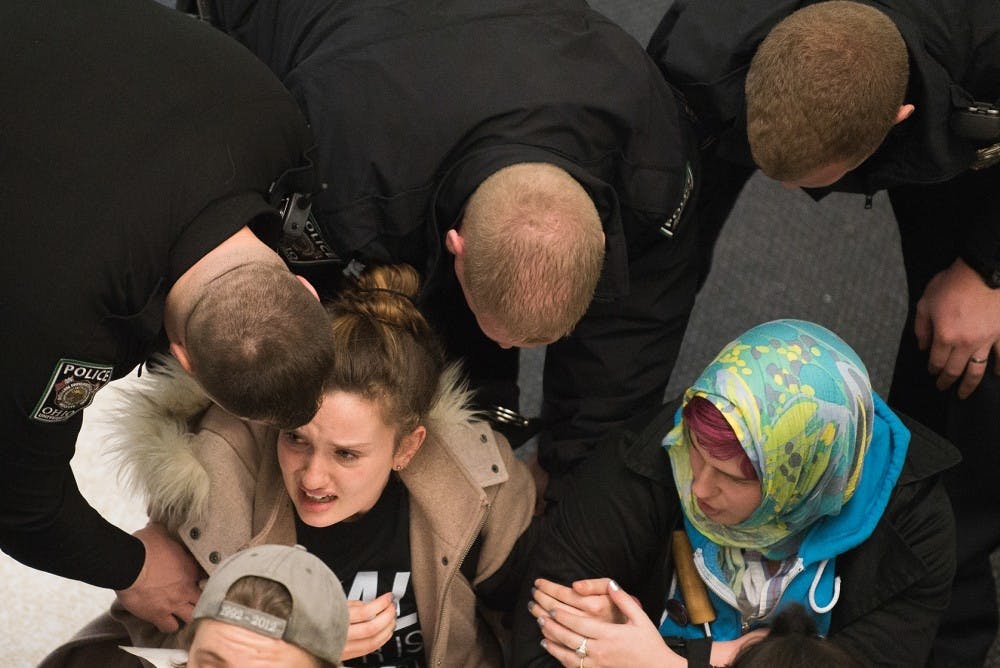A new Ohio University policy, titled “Freedom of Expression,” bans demonstrations, sit-ins, speeches and more inside university buildings.
Ohio University announced the new policy Friday, along with changes to its use of outdoor space policy. The changes allow the university to limit conduct that disrupts its operations, interferes with student activities or poses safety risks.
The policies took effect on an interim basis on Aug. 17, but the university did not release information until Friday. OU Spokeswoman Carly Leatherwood said in an email that because the process to post policies online can take weeks, the policy did not go up until Tuesday.
“Legal Affairs has told me that the University would not enforce a policy until it is posted in the policy manual,” Leatherwood said in the email. “So in this case, the real effective date is Sept. 5.”
On Feb. 1, OU Police Department officers arrested 70 protesters in Baker Center during a sit-in in which the protesters demanded OU become a sanctuary campus. The university argued that the protestors were trespassing and their arrest was necessary because they blocked foot traffic in Baker Center and created an unsafe environment.
In March, an Athens County Municipal Court judge found one of the protesters not guilty of trespassing. Judge Todd Grace said a previous university decision to keep Baker Center open late for protesters established the building as a public forum, and no university policy contradicted that. Charges against the remaining protesters were dropped.
The new policy bans “demonstrations, rallies, public speech-making, picketing, sit-ins, marches, protests, and similar assemblies” from inside university buildings. It states that students may reserve space indoors to participate in “constitutionally protected speech” and activities.
A university news release called the part of the policy forbidding indoor demonstrations a continuation of a “long-standing prohibition of demonstrations and sit-ins inside buildings.” In a follow-up email, Leatherwood did not specify any concrete policy that banned such events.
“In the past, demonstrations and sit-ins inside buildings were considered to be disruptive to university operations and our practice was typically to disperse such gatherings,” Leatherwood said in an email. “The new Freedom of Expression policy was adopted to lend consistency and predictability to the University’s handling of these events. “
The university reserves the right to limit use of some indoor and outdoor spaces to only registered students and university groups. It may also segregate protesters at outdoor events to a designated space if the university decides that is necessary to “preserve order and ensure the physical safety of all participants in the event.”
The new policy also clarifies the university’s definition of disruptive conduct. As defined by the university, disruptive conduct interferes with university employee’s abilities to do their jobs, interferes with an authorized event, impedes the flow of traffic or poses a threat to people or university property. The university also defines conduct as disruptive if it stops students from using facilities or participating in academic, research or extracurricular activities.
The university revised its use of outdoor space policy for the Athens campus in accordance with the freedom of expression policy. The interim policy provides detailed, individualized guidelines for use of 26 outdoor locations on campus. Guidelines include provisions on how long space can be reserved, how much noise is permitted and what signs are permitted.
For example, at the fourth floor entrance of Baker Center, at no point should “passersby be verbally harassed, involuntarily stopped, or deterred.” At Wolfe Garden, between Alden Library and Cutler Hall, noise may not exceed a conversational level. Banners promoting a ballot issue or political candidate are not permitted at Alumni Gateway.
Both policies are interim policies. The university enacts interim policies when “legal requirements or administrative necessity” require a policy to go into effect immediately.
Interim policies may be in effect for an initial period of six months, and the university can extend the interim policy for two additional six month periods before replacing it with a permanent policy.
“Through the adoption of a permanent policy, the University intends to memorialize our institution’s commitment to the free exchange of ideas and First Amendment principles while ensuring the safe operation of our campus,” reads a university news release.
Faculty, Administrative and Classified senates, the Student and Graduate Student Senates, deans, chairs and directors, the chief of police and the executive director of Baker Center will each have a chance to review the interim policies. They must provide any feedback by Oct. 6.






